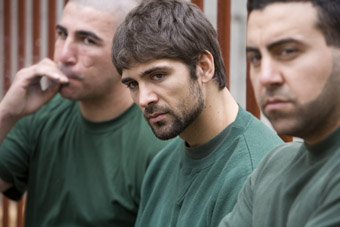 |
Cedar Boys |
Caradee graduated from AFTRS in 2000 and made a number of successful shorts including Bound, which won the Dendy Award for Best Short Film at the Sydney Film Festival. Cedar Boys (which he also wrote) was developed as part of Screen Australia’s Indivision Lab and it seems that this program is finally beginning to bear fruit; it’s a script that appears to have been carefully nurtured and fine-tuned. Caradee has a great ear for dialogue and as we’re cruising the streets with the three central characters—Tarek (Les Chantery), Sam (Waddah Sari) and Nabil (Buddy Dannoun)—we get real insight into men who are constantly under surveillance: by parents, police, a community deeply suspicious of anyone ‘of Middle Eastern appearance’ after the September 11 attacks and racist targeting by the Howard government. Tarek might be 24 but still lives at home with his parents and little sister, his mother continually asking where he’s going, what time he’ll be home, why he’s spending so much money. His older brother Jamal (played by the intensely charismatic Bren Foster) is in jail and his mother tries futilely to control Tarek’s movements, to stop him going down the same path. It's the film’s greatest irony that the hope his brother will be freed makes Tarek compromise his strong moral code and consider crime as an option.
A number of critics have compared Caradee's vision with Martin Scorsese's and there is that sense of a life lived alongside these fellas, of men drawn to crime as the only means to rise above their menial jobs (Tarek works as a panelbeater and is constantly denigrated by his boss; Nabil cleans apartments for those who can afford all the luxuries he can only dream of and scheme about). Sam is apparently doing well (financially at least) but he is taking risks dealing drugs. Caradee mentions the direct influence of Scorsese on the project’s early development: watching Mean Streets and Goodfellas, he wondered why the men he knew, living on the streets of Sydney’s south-west, weren’t appearing on Australian screens.
It must be something to celebrate for the main actors to be cast in a film that doesn’t portray them as one-dimensional bad guys, terrorists, gangbangers or clowns sending themselves up. Chantery comments, "It’s not a mockery...Every time people see Lebanese or think Lebanese they think Fat Pizza. It’s nothing like that. And that’s what I loved about it." The script has an added dimension by adding Tarek’s love interest Amie (Rachael Taylor, star of Hollywood blockbuster Transformers) and her eastern suburbs friends. This creates the opportunity to explore the underlying racism encountered daily by Lebanese-Australian men: routinely barred from entry into nightclubs (unless accompanied by beautiful Australian women), or their appearance queried at parties in richer suburbs, unless they have a stash of pills for sale. But Taylor’s presence also highlights the film’s main weakness. Her performance is stilted against Chantery’s lovely melancholy—he knows she is forever out of reach—and she just seems too glamorous; the relationship never captures the dramatic tension that the men create between themselves almost effortlessly.
Serhat Caradee’s film is an intelligent and heartening low-budget feature delving into the rarely seen onscreen Lebanese-Australian subculture, exactly the kind of film Indivision Lab should be supporting. His extensive use of locations over a 26-day shoot, and the new Red 4K camerawork (the graininess suits the characters) by Peter A Holland, means the film often has a documentary fluidity as the characters drift through the streets. While the pace is at times uneven and some of the actors outperform others, the strength of the dialogue, the convincing main ensemble cast (particularly Chantery) who deliver it and the detail in recreating their edgy world, make Cedar Boys a powerful first tryout. Let’s hope it starts to get westie (and other) audiences into the cineplexes to see Australian cinema.
Cedar Boys, writer, director Serhat Caradee, producers Jeff Purser, Ranko Markovic, Matthew Dabner, editor Suresh Ayyar, production designer Claire Granville, director of photography Peter A Holland, composer Khaled Sabsabi.
www.cedarboysthemove.com
RealTime issue #92 Aug-Sept 2009 pg.
© Kirsten Krauth; for permission to reproduce apply to [email protected]








 back
back